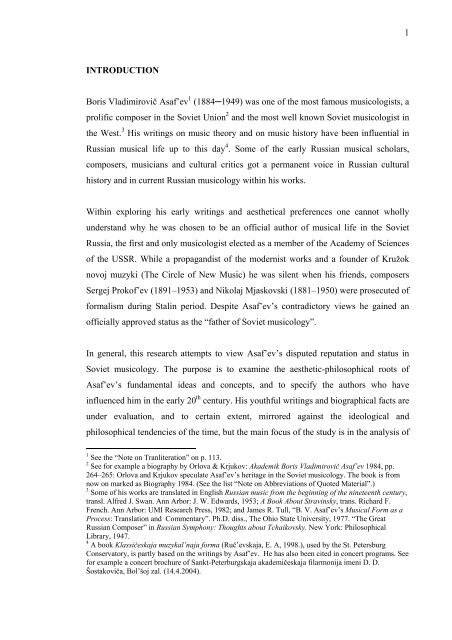Boris Asaf'ev and the Soviet Musicology - E-thesis
Boris Asaf'ev and the Soviet Musicology - E-thesis
Boris Asaf'ev and the Soviet Musicology - E-thesis
Create successful ePaper yourself
Turn your PDF publications into a flip-book with our unique Google optimized e-Paper software.
INTRODUCTION<br />
<strong>Boris</strong> Vladimirovič Asaf’ev 1 (1884─1949) was one of <strong>the</strong> most famous musicologists, a<br />
prolific composer in <strong>the</strong> <strong>Soviet</strong> Union 2 <strong>and</strong> <strong>the</strong> most well known <strong>Soviet</strong> musicologist in<br />
<strong>the</strong> West. 3 His writings on music <strong>the</strong>ory <strong>and</strong> on music history have been influential in<br />
Russian musical life up to this day 4 . Some of <strong>the</strong> early Russian musical scholars,<br />
composers, musicians <strong>and</strong> cultural critics got a permanent voice in Russian cultural<br />
history <strong>and</strong> in current Russian musicology within his works.<br />
Within exploring his early writings <strong>and</strong> aes<strong>the</strong>tical preferences one cannot wholly<br />
underst<strong>and</strong> why he was chosen to be an official author of musical life in <strong>the</strong> <strong>Soviet</strong><br />
Russia, <strong>the</strong> first <strong>and</strong> only musicologist elected as a member of <strong>the</strong> Academy of Sciences<br />
of <strong>the</strong> USSR. While a propag<strong>and</strong>ist of <strong>the</strong> modernist works <strong>and</strong> a founder of Kružok<br />
novoj muzyki (The Circle of New Music) he was silent when his friends, composers<br />
Sergej Prokof’ev (1891–1953) <strong>and</strong> Nikolaj Mjaskovski (1881–1950) were prosecuted of<br />
formalism during Stalin period. Despite Asaf’ev’s contradictory views he gained an<br />
officially approved status as <strong>the</strong> “fa<strong>the</strong>r of <strong>Soviet</strong> musicology”.<br />
In general, this research attempts to view Asaf’ev’s disputed reputation <strong>and</strong> status in<br />
<strong>Soviet</strong> musicology. The purpose is to examine <strong>the</strong> aes<strong>the</strong>tic-philosophical roots of<br />
Asaf’ev’s fundamental ideas <strong>and</strong> concepts, <strong>and</strong> to specify <strong>the</strong> authors who have<br />
influenced him in <strong>the</strong> early 20 th century. His youthful writings <strong>and</strong> biographical facts are<br />
under evaluation, <strong>and</strong> to certain extent, mirrored against <strong>the</strong> ideological <strong>and</strong><br />
philosophical tendencies of <strong>the</strong> time, but <strong>the</strong> main focus of <strong>the</strong> study is in <strong>the</strong> analysis of<br />
1 See <strong>the</strong> “Note on Tranliteration” on p. 113.<br />
2 See for example a biography by Orlova & Krjukov: Akademik <strong>Boris</strong> Vladimirovič Asaf’ev 1984, pp.<br />
264–265: Orlova <strong>and</strong> Krjukov speculate Asaf’ev’s heritage in <strong>the</strong> <strong>Soviet</strong> musicology. The book is from<br />
now on marked as Biography 1984. (See <strong>the</strong> list “Note on Abbreviations of Quoted Material”.)<br />
3 Some of his works are translated in English Russian music from <strong>the</strong> beginning of <strong>the</strong> nineteenth century,<br />
transl. Alfred J. Swan. Ann Arbor: J. W. Edwards, 1953; A Book About Stravinsky, trans. Richard F.<br />
French. Ann Arbor: UMI Research Press, 1982; <strong>and</strong> James R. Tull, “B. V. Asaf’ev’s Musical Form as a<br />
Process: Translation <strong>and</strong> Commentary”. Ph.D. diss., The Ohio State University, 1977. “The Great<br />
Russian Composer” in Russian Symphony: Thoughts about Tchaikovsky. New York: Philosophical<br />
Library, 1947.<br />
4 A book Klassičeskaja muzykal’naja forma (Ruč’evskaja, E. A, 1998.), used by <strong>the</strong> St. Petersburg<br />
Conservatory, is partly based on <strong>the</strong> writings by Asaf’ev. He has also been cited in concert programs. See<br />
for example a concert brochure of Sankt-Peterburgskaja akademičeskaja filarmonija imeni D. D.<br />
Šostakoviča, Bol’šoj zal. (14.4.2004).<br />
1

















